Stoicism has profoundly shaped Western thought, especially in how Christianity developed its focus on virtue, moral discipline, and resilience. You’ll see echoes of Stoic ideas in Christian concepts like divine reason, moral integrity, and acceptance of fate or divine providence. These philosophies emphasize inner strength and rational living, influencing ethics and personal growth through history. If you explore further, you’ll uncover how these ideas continue to influence modern values and self-improvement principles today.
Key Takeaways
- Stoic ideas like natural law and divine reason influenced early Christian concepts of divine order and moral duty.
- Christian virtues such as self-control, patience, and moral integrity draw heavily from Stoic principles.
- The concept of Logos in Christianity parallels Stoic rationality and divine reason guiding moral and natural harmony.
- Christian practices of humility, temperance, and inner discipline reflect Stoic emphasis on virtue cultivation.
- Renaissance rediscovery of Stoic texts fostered a moral philosophy blending Stoic resilience with Christian virtues, shaping Western thought.
The Origins of Stoic Philosophy and Its Core Principles
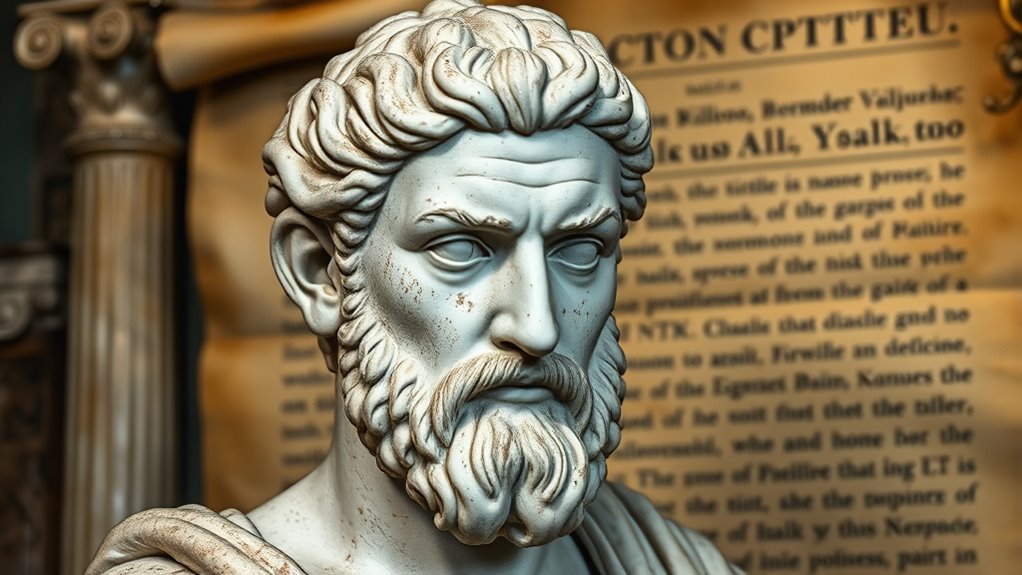
Stoic philosophy originated in ancient Greece around the early 3rd century BCE, emerging from the teachings of Zeno of Citium.
Stoic philosophy began in ancient Greece in the early 3rd century BCE with Zeno of Citium.
You’re introduced to a worldview that emphasizes living in harmony with nature and focusing on what you can control.
The core principles include virtue as the highest good, meaning your moral character is paramount.
You learn to distinguish between what’s within your power—your thoughts, actions, and choices—and what’s outside it, like external events or opinions.
By cultivating wisdom, self-discipline, and resilience, you aim to achieve inner tranquility, or ataraxia.
Stoics believe that by mastering your mind and emotions, you can navigate life’s challenges with equanimity, maintaining a sense of peace regardless of external circumstances.
Additionally, understanding the importance of creative practice can help individuals develop resilience and problem-solving skills, which are essential in applying Stoic principles to everyday life.
Furthermore, the practice of mindfulness aligns with Stoic teachings by promoting awareness of your thoughts and reactions, facilitating better emotional regulation.
Developing an awareness of common pitfalls can enhance one’s ability to apply Stoic practices effectively and avoid unnecessary setbacks.
Early Encounters Between Stoicism and Christianity
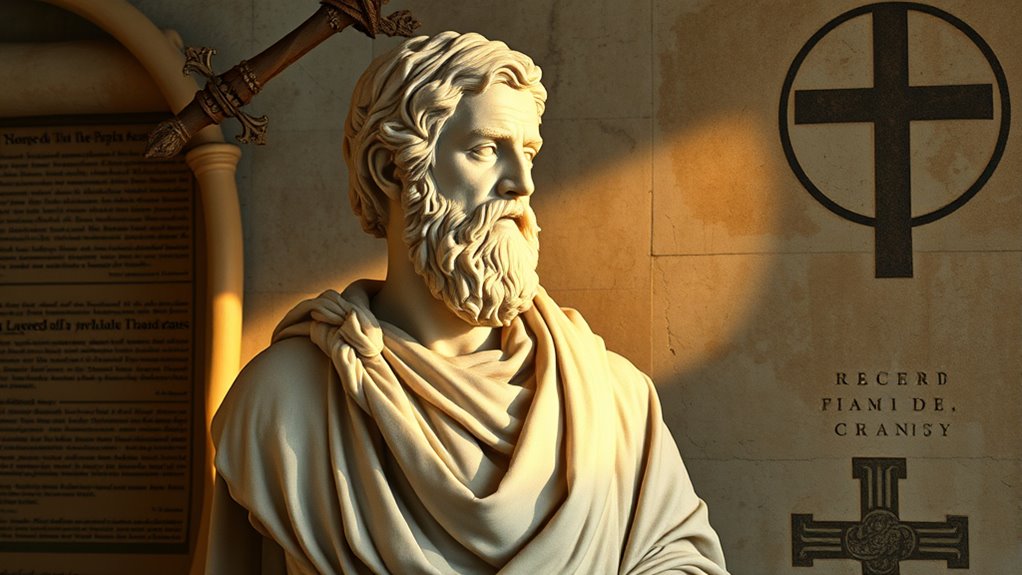
As Christianity emerged in the Roman Empire, it encountered philosophical ideas rooted in Stoic thought, which had already influenced many aspects of Roman culture. Early Christians, especially apologists, drew on Stoic concepts like natural law, divine reason, and moral duty to articulate their beliefs. They saw parallels between Stoic ethics and Christian teachings about virtue, self-control, and harmony with God’s plan. They also appreciated the Stoic focus on rational harmony, which aligned with Christian beliefs about divine order. The emphasis on moral integrity from Stoic philosophy resonated deeply with Christian ideals of virtue and ethical living. Some thinkers, such as Justin Martyr, explicitly referenced Stoic ideas to make Christianity more understandable within the Roman intellectual landscape. They also recognized the importance of cosmopolitanism, which helped early Christians to foster a sense of universal community beyond local and ethnic divisions. Additionally, the Stoic emphasis on divine reason contributed to the development of Christian theological concepts related to God’s Logos. The Stoic focus on self-control and inner discipline also influenced Christian ascetic practices and moral formation. While Christians rejected some Stoic ideas, they appreciated the emphasis on moral integrity and the pursuit of virtue. These early interactions helped shape Christian theology, blending Stoic moral ideals with Christian doctrines, laying groundwork for future philosophical synthesis.
The Role of Virtue and Moral Character in Both Traditions

You’ll see that virtue stands as a core ideal in both Stoicism and Christianity, shaping how followers define moral excellence. Both traditions emphasize developing moral character through consistent practice and self-discipline. These principles guide ethical living, inspiring individuals to embody virtues like wisdom, courage, and compassion. Incorporating moral virtues into daily life is essential for achieving personal and spiritual growth within these philosophies. Recognizing how prophetic dreams can serve as spiritual insights encourages a deeper understanding of divine guidance and moral development.
Virtue as Central Ideal
Virtue serves as the cornerstone of moral life in both Stoic philosophy and Christianity, shaping how adherents define the good and pursue moral excellence. In both traditions, virtue isn’t just a trait but the central goal of human life. Stoics emphasize virtues like wisdom, courage, temperance, and justice as essential for living in harmony with nature and reason. Similarly, Christianity highlights virtues such as love, humility, patience, and charity as pathways to spiritual fulfillment and divine favor. Both traditions also recognize moral character as a fundamental aspect of virtue, guiding ethical behavior and personal development. Cultivating these qualities consistently is seen as a way to develop moral excellence and align oneself with higher principles, whether divine or natural. This ongoing cultivation helps individuals achieve personal virtue and maintain moral integrity amid life’s challenges. Engaging in regular reflection and self-improvement is considered crucial for nurturing virtue development, reinforcing one’s commitment to moral ideals. You’re encouraged to cultivate these qualities consistently, believing that moral excellence aligns you closer to the divine or natural order. Both traditions see virtue not only as an individual pursuit but as fundamental to the moral fabric of a well-lived life.
Moral Character Development
Moral character development is central to both Stoic philosophy and Christianity, with each tradition emphasizing the importance of cultivating virtues to shape a person’s nature. You’re encouraged to practice virtues like wisdom, courage, temperance, and justice, which become the foundation of your moral identity.
In Stoicism, developing self-control and rational judgment helps you remain steadfast amid life’s challenges. Cultural intelligence can play a role in understanding how virtues are expressed and valued across different cultural contexts, enhancing moral development. Recognizing the influence of cultural values can deepen your appreciation of diverse moral perspectives and foster greater empathy. Additionally, understanding the cultural context of virtue expression can improve your ability to embody these qualities in various social settings. Fostering moral awareness can help you navigate complex social situations with integrity and insight. Exploring how cultural norms shape moral expectations can further refine your understanding of virtue in different societies.
Christianity emphasizes virtues such as humility, charity, and forgiveness, guiding your daily actions and inner intentions.
Both traditions see moral growth as a lifelong process, where deliberate effort transforms character.
By nurturing these virtues, you align your behavior with higher principles, fostering integrity and inner strength.
This shared focus underscores how character formation is essential to living a morally upright life in both philosophies.
Ethical Living Principles
Both Stoic philosophy and Christianity place a strong emphasis on living ethically through the cultivation of virtues and moral character. You’re encouraged to develop qualities like wisdom, courage, temperance, and justice, which guide your actions and decisions. In both traditions, moral integrity isn’t just about following rules but embodying virtues in daily life. Christianity teaches love, compassion, humility, and forgiveness as core principles, shaping how you treat others. Similarly, Stoicism urges you to practice self-control, rationality, and resilience to maintain inner harmony. These principles serve as a foundation for ethical living, helping you navigate challenges with virtue and integrity. Additionally, the value of WWE Raw’s financial impact highlights how cultural and entertainment industries influence societal values and aspirations, emphasizing the importance of moral character in both personal and collective success. Recognizing the role of moral virtues in shaping societal norms underscores the enduring relevance of these ethical principles across different contexts. Cultivating these virtues can also promote ethical decision-making in various aspects of life, fostering a more just and compassionate society. Moreover, understanding how virtue cultivation is emphasized in both traditions can inspire individuals to lead more meaningful and morally upright lives. Developing a strong sense of personal integrity can further enhance your ability to uphold these virtues in everyday interactions.
The Concept of Fate and Providence in Stoic and Christian Thought
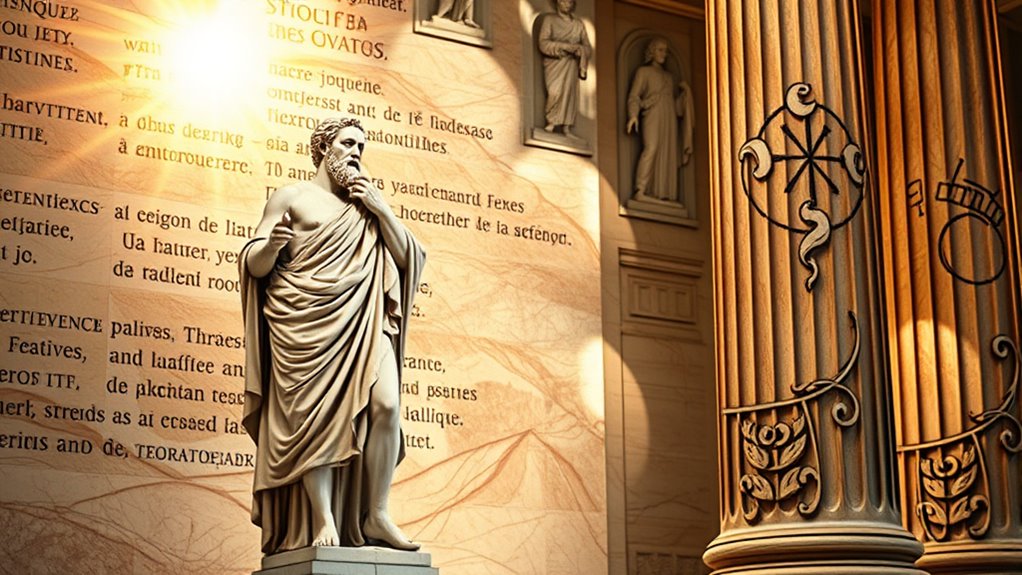
Although their ideas about fate and divine guidance differ, Stoic and Christian thought both emphasize a sense of order in the universe.
Both Stoic and Christian philosophies highlight a universal order guiding our lives.
In Stoicism, fate is seen as the rational unfolding of nature’s Logos, which guides everything with divine reason. You accept that events are predetermined, but your focus is on aligning your will with this natural order through virtue.
Christianity, on the other hand, views divine Providence as God’s active guidance and care over creation. You believe that God’s plan is purposeful, and trust that, even in hardship, there’s a divine reason behind events.
Both traditions encourage you to recognize a higher purpose governing life’s course, fostering acceptance and trust, whether through rational fate or divine guidance.
The Impact of Stoic Ethics on Medieval Christian Morality

The ethical principles of Stoicism profoundly influenced medieval Christian morality by shaping ideas about virtue, self-control, and the pursuit of the good life. You see, Stoic virtues like wisdom, courage, temperance, and justice found their way into Christian teachings, emphasizing moral integrity and inner discipline. This blending encouraged believers to focus on moral excellence and spiritual resilience amid hardships. To deepen this connection, consider the table below, which illustrates key Stoic virtues and their Christian counterparts:
| Stoic Virtue | Christian Virtue | Common Focus |
|---|---|---|
| Wisdom | Prudence | Seeking divine truth |
| Courage | Fortitude | Enduring suffering |
| Temperance | Moderation | Self-control in desires |
| Justice | Charity | Love and fairness |
| Self-control | Chastity | Disciplined spiritual life |
Renaissance Reinterpretations of Stoic Ideas in Western Philosophy

During the Renaissance, you see scholars rediscover classical texts that had been lost for centuries, sparking renewed interest in Stoic ideas.
This period emphasizes humanism and a focus on ethics, shaping new approaches to moral philosophy.
These reinterpretations also influence philosophical methods, encouraging critical thinking and personal reflection.
Rediscovery of Classical Texts
The Renaissance sparked a renewed interest in classical texts, leading scholars to rediscover and reinterpret Stoic ideas within the context of Western philosophy. You’ll find that texts from Epictetus, Seneca, and Marcus Aurelius were translated into Latin and vernacular languages, making them accessible again.
This rediscovery sparked debates about virtue, self-control, and rationality, which influenced contemporary thinkers. As you explore these texts, you’ll notice how Renaissance scholars emphasized Stoic resilience and ethical self-mastery, often blending them with Christian ideas.
This revival shifted philosophical focus from medieval theological debates to personal virtue and moral independence. By engaging directly with original Stoic writings, you gain a clearer understanding of their relevance and how they shaped modern ideas of morality, rationality, and human agency.
Humanism and Ethical Focus
Renaissance thinkers reinterpreted Stoic ideas through a humanist lens, emphasizing individual moral development and personal virtue. They believed that cultivating inner character was essential for leading a meaningful life, shifting focus from divine intervention to human responsibility.
This perspective encouraged you to seek wisdom, self-control, and resilience as core virtues. Humanists promoted reason and education as tools for moral improvement, aligning with Stoic ideals of rationality guiding ethical conduct.
They also emphasized the importance of civic virtue, urging you to contribute positively to society. This reinterpretation made Stoic ethics more accessible and relevant, inspiring you to pursue personal excellence and ethical integrity as central to human fulfillment.
It laid the groundwork for a more autonomous, morally driven approach to life in Western thought.
Influence on Philosophical Methods
Renaissance thinkers transformed Stoic ideas into innovative philosophical methods that emphasized rational inquiry and personal reflection. They shifted focus from strict dogma to the individual’s capacity for reason and self-examination.
You’re encouraged to question assumptions, analyze arguments critically, and seek clarity through direct observation and logical reasoning. This approach fostered a more active engagement with philosophical questions, moving beyond passive acceptance of tradition.
You learn to examine your own beliefs, challenge inconsistencies, and refine your understanding through evidence and dialogue. These methods laid the groundwork for modern scientific inquiry and humanist scholarship.
Enlightenment Perspectives: Rationality and Moral Autonomy

Enlightenment thinkers championed rationality as the key to understanding human nature and improving society, emphasizing reason as the primary tool for inquiry and decision-making. They believed that individuals, equipped with rational thought, could determine moral truths independently of tradition or authority.
This shift empowered you to question established beliefs and seek moral autonomy through critical thinking. Reason became central to constructing ethical systems grounded in human experience rather than divine command.
By promoting individual judgment, Enlightenment ideas fostered a sense of personal responsibility for moral choices. This perspective challenged earlier reliance on religious authority, emphasizing that moral progress depended on human capacity for rational reflection.
As a result, rationality and autonomy became foundational for modern notions of ethics, liberty, and self-determination.
Modern Resilience and Virtue: Stoic Legacies in Contemporary Culture
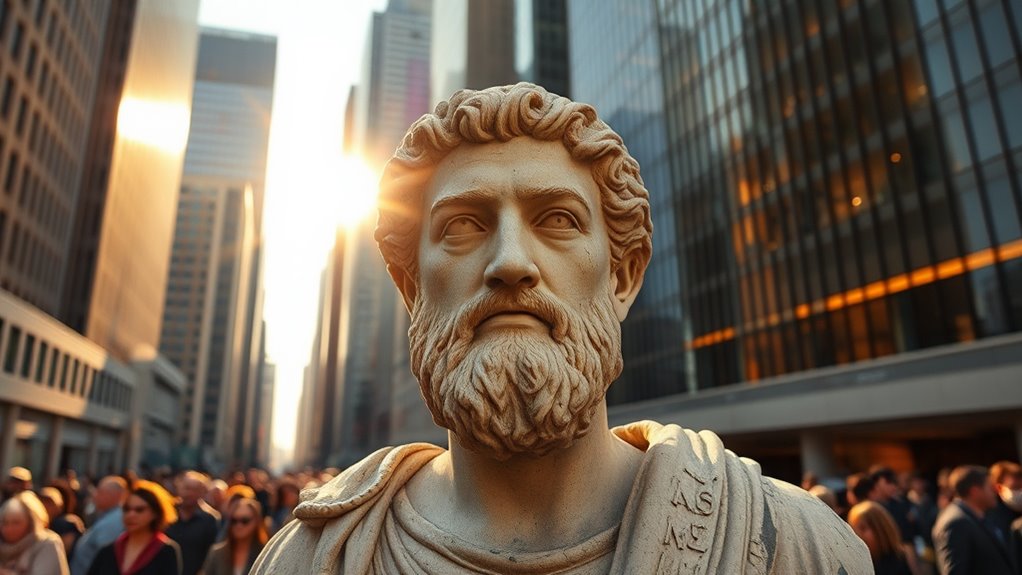
The emphasis on rational autonomy during the Enlightenment has shaped how modern society approaches resilience and virtue. Today, you’re encouraged to cultivate inner strength through self-control and rational thinking, echoing Stoic principles.
In everyday life, this means facing challenges with calmness and acceptance rather than avoidance or emotional reactivity. You learn to focus on what you can control, fostering resilience amid adversity.
Virtue is seen as a personal pursuit—integrity, patience, and self-discipline—key to steering a complex world. Media, psychology, and self-help movements often draw on Stoic ideas to promote mental toughness and emotional regulation.
These legacies influence your understanding of resilience, shaping how you handle setbacks and define moral character in contemporary culture.
Cross-Influences: Stoicism’s Role in Developing Western Humanism
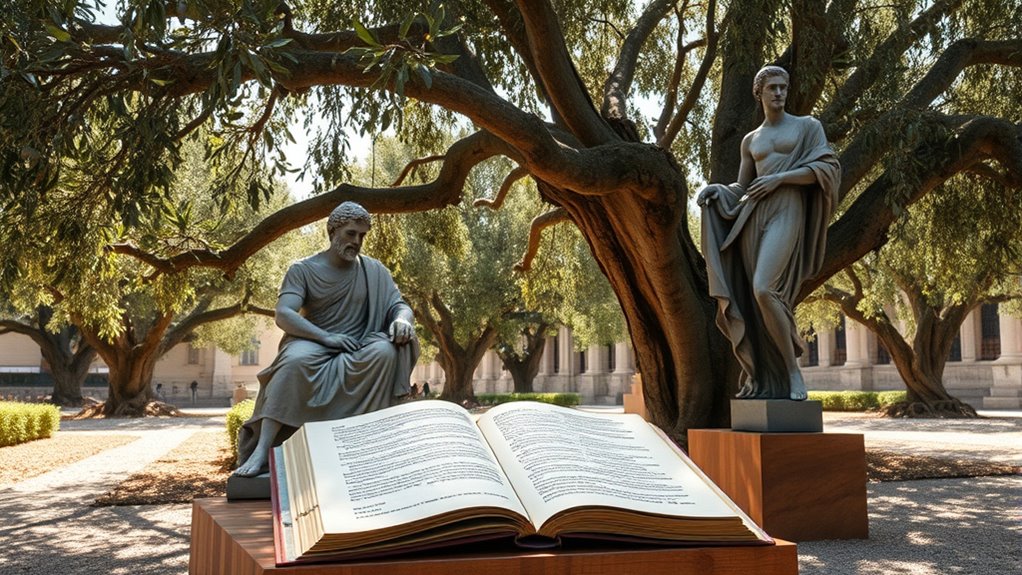
Stoicism has profoundly shaped the development of Western humanism by emphasizing the value of reason, individual dignity, and moral virtue. These principles fostered a focus on personal ethical growth and the capacity for rational thought, laying a foundation for human-centered philosophy. As a result, thinkers like Erasmus and Montaigne drew on Stoic ideas to champion education, tolerance, and self-awareness. The table below highlights key aspects of this influence:
| Aspect | Example | Impact |
|---|---|---|
| Reason | Promoting rational debate | Encouraged critical thinking |
| Dignity | Respect for individual worth | Supported human rights |
| Virtue | Moral self-improvement | Inspired ethical frameworks |
| Self-Reflection | Personal accountability | Cultivated introspection |
| Resilience | Endurance through adversity | Fostered mental strength |
Continuing Dialogue: The Relevance of Stoic Principles Today
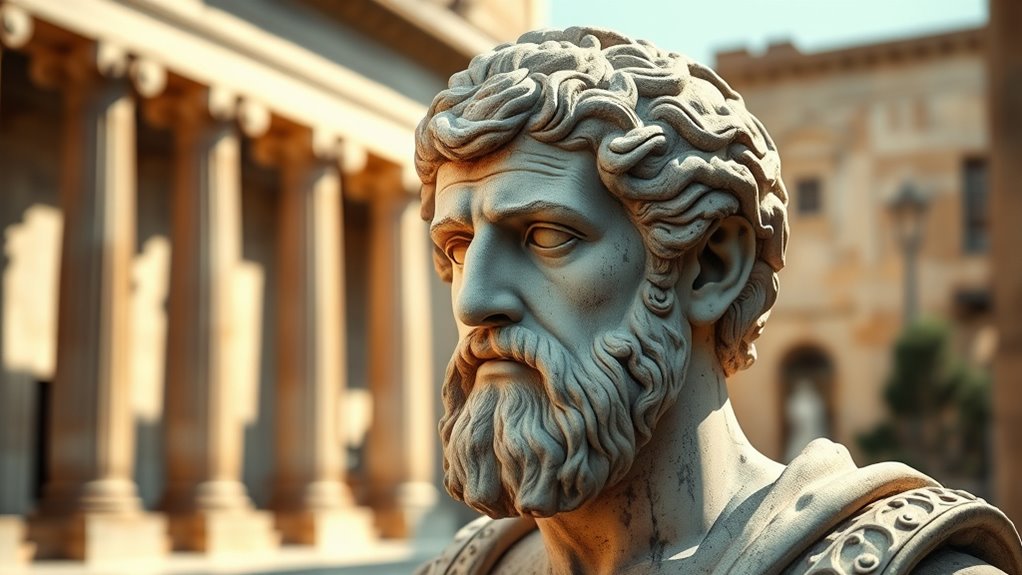
Today, the principles that once fueled the development of Western humanism continue to resonate in contemporary life. You can apply Stoic ideas like resilience, self-control, and acceptance to everyday challenges.
In a fast-paced world, embracing the Stoic focus on what you can control helps reduce stress and anxiety. Practicing mindfulness and reflection, key Stoic practices, support mental clarity and emotional stability.
Focusing on what you can control reduces stress and fosters emotional stability through mindfulness and reflection.
You might also find value in Stoic teachings about virtue, ethics, and living in accordance with nature, guiding you to make better decisions and build inner strength. These timeless principles offer practical tools for traversing modern obstacles, fostering a sense of purpose, and cultivating resilience in an ever-changing world.
Stoicism remains a relevant philosophy for personal growth and societal well-being today.
Frequently Asked Questions
How Did Stoicism Influence Early Christian Theology and Doctrines?
You see, early Christian theology and doctrines were shaped by various philosophical ideas, including Stoicism. You might notice that concepts like virtue, self-control, and acceptance of divine will echo Stoic teachings.
These ideas helped early Christians develop their understanding of moral character and how to live in harmony with God’s plan. By integrating Stoic principles, they reinforced the importance of inner peace, resilience, and ethical conduct in their faith.
Are There Similarities Between Stoic and Christian Views on Salvation?
You might notice that both Stoic and Christian views on salvation emphasize inner transformation and moral integrity.
While Stoics focus on mastering passions and aligning with nature, Christians highlight faith and divine grace.
Coincidentally, both paths aim for a higher state of being, guiding you toward virtue and peace.
Their shared goal of moral renewal underscores a universal desire for salvation, transcending specific doctrines.
How Did Stoic Ideas Shape the Development of Western Legal Systems?
You see how Stoic ideas shaped Western legal systems by emphasizing virtue, justice, and rationality. These principles influenced concepts like fairness, moral responsibility, and the rule of law.
You realize that Stoic emphasis on reason and self-control helped develop ideas of personal accountability and ethical governance. These values became foundational in shaping laws that promote justice, equality, and social order, impacting the evolution of Western legal traditions profoundly.
In What Ways Did Renaissance Thinkers Reinterpret Stoic Virtues?
Oh, you think Renaissance thinkers just rediscovered old books? Think again! They reinterpreted Stoic virtues with a splash of humanism, emphasizing individual agency, emotion, and personal achievement.
Instead of strict austerity, they embraced reason as a tool for self-improvement and societal progress. You’d be surprised how they turned Stoic ideals into passionate pursuits, blending reason and emotion—making virtue not just a duty, but a personal adventure.
Can Stoic Principles Be Integrated Into Modern Christian Practices?
You can integrate Stoic principles into modern Christian practices by emphasizing virtues like patience, self-control, and resilience. These align with Christian teachings on humility and perseverance.
Practicing daily reflection and mindfulness helps you cultivate inner strength and emotional resilience.
Conclusion
You now see how Stoic philosophy has profoundly shaped Western thought, from early Christian values to modern resilience strategies. Interestingly, a 2022 survey found that 70% of people turn to Stoic principles to manage stress today. By understanding these connections, you can appreciate how ancient wisdom continues to inspire moral strength and rationality in your life, proving that Stoicism’s influence remains as relevant as ever in steering today’s challenges.









